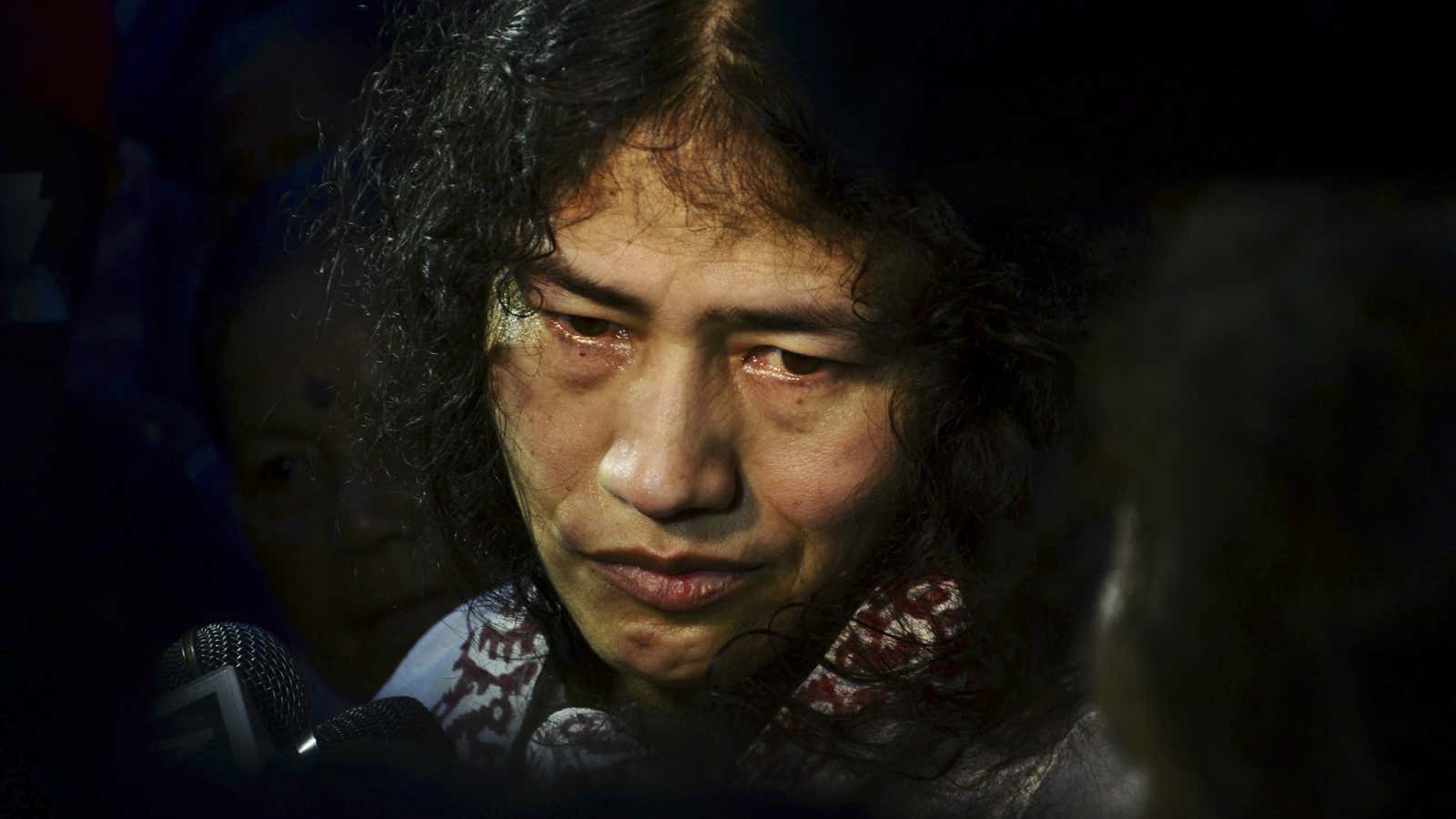Irom Chanu Sharmila hasn’t eaten since Nov. 2000, but she might soon.
The iconic dissenter from Manipur, a state in India’s northeast, has decided to end her extraordinary hunger strike just short of completing 16 years.
It’s not that Sharmila’s long fight against the Armed Forces Special Powers Act (Assam and Manipur) 1958—or simply, the AFSPA—is over. Outside an Imphal court, where she was brought for a routine hearing on July 26, Sharmila described her decision as only a change of strategy.
On August 9, when she appears before the same court again for another hearing, she will pledge to give up her hunger strike, and earn her freedom. She will then join mainstream politics and chalk out new battle plans against the AFSPA.
It is an unexpected end to an act of dissent that intermittently caught the nation’s imagination. Yet her prolonged protest—which made Amnesty International describe her as a “prisoner of conscience”—has not managed to move the Indian state’s stand on AFPSA, thereby necessitating a change in approach. Whether she will continue to command the same attention in her new avatar as a politician is a thought that would worry her supporters as well as campaigners against the AFSPA. Essentially it is a bit of a Catch-22 situation, which her supporters are acutely aware of.
Will Sharmila be able to revolutionise politics in Manipur, currently in an advanced stage of atrophy due to widespread corruption, mutual mistrust amongst ethnic groups, and uninspiring leadership? Should her putative rivals be worried? Many are sceptical and concerned that she may end up getting mauled, given her inexperience and lack of organisational support. For the moment, she has no affiliation with any political party and, therefore, plans to fight as an independent candidate.
Her political prospects could quickly change if some party manages to woo her in the six months remaining before the state assembly elections in February 2017. However, it would be next to impossible for her to float a new party now and hope to make a dent in state politics, at least immediately.
Waning support for caged icon
From her tone in her interaction with the media, Sharmila sounded exasperated. That’s partly because she said she felt her fast was having no effect on the government. She also felt there is little or no sustained visible public support left for her struggle.
She is probably right in both her laments. Regardless of paper campaigns by activists in Delhi and elsewhere, or periodic eruptions of violent protests in Manipur and Kashmir, the government has shown no sign of softening its stance on AFSPA.
It is also true that in her epic fight, she is increasingly being reduced to a caged icon by both her detractors and supporters. For the former, she is an unwitting front for anti-national elements to vilify India. For the latter, the protest posters and graffiti her heroic fast generates were becoming more important than her personal welfare or emotional state.
Weeks and months at a stretch, she was there in her lonely hospital prison cell with no visitor to reassure her in her fight, Sharmila implied, adding that they only pledge moral support to her in newspaper commentaries and demagogic public speeches.
Sharmila was only 28 when she began her protest fast in November 2000, outraged by the massacre of 10 bystanders at a bus stop on the outskirts of Imphal, the state’s capital. The killings were a retaliatory act by soldiers of the Assam Rifles after a bomb exploded near one of their convoys in the vicinity of the bus stop in Malom. The soldiers also went on an extended rampage in nearby villages, injuring many others.
The 44-year-old has not eaten anything since, and had been taken into preventive custody for “attempt to commit suicide” under section 309 of the Indian Penal Code. She is kept alive through nose-feeding in her hospital jail ward at the Jawaharlal Nehru Institute of Medical Sciences, Imphal.
As an under-trial, she has been produced routinely before the court and ritually released and rearrested under fresh charges of attempted suicide. This is to skirt a legal clause that forbids detention of under-trial prisoners for more than a year.
The AFSPA’s long shadow

AFSPA was first promulgated in Assam and parts of Manipur in 1958, in the wake of the outbreak of the Naga insurgency. The state of Assam was still undivided then and constituted the entire Northeast, with the exception of Manipur and Tripura.
In 1980, the Act was extended to the whole of Manipur and then to Tripura in 1997, thereby, making it applicable to the entire northeast. The Act was amended in 1990 to make it applicable to the strife-hit northern Indian state of Jammu and Kashmir as well.
Other than the northeast and Kashmir, AFSPA is not applicable anywhere in India, not even in the heartland of Maoist rebellion in central India, raising suspicion that there is a racial character to it.
In the past, several judicial commissions—even a supreme court ruling earlier this month—recommended moderation and containment of the powers as well as impunity extended to the Indian Army and other central forces under the purview of AFSPA.
The AFSPA gives sweeping powers to security forces, including, among other things, to search or arrest without warrant, destroy structures said to be sheltering insurgents, or use of force to the extent of causing death merely on suspicion.
Disappointment, disillusionment
There are some in Manipur, including amongst her supporters, who think Sharmila’s decision may unsettle the campaign against AFSPA, and grudge her for this. Many others disagree, believing Sharmila’s contribution to the cause, having sacrificed 16 years of her youth to it, is already unparalleled. According to them, it is arguable that her decision to end her fast would boost the public recall of this draconian act.
Yet others are of the opinion that to believe the anti-AFSPA campaign depended solely on Sharmila’s reputation would betray the movement’s weakness. The leader—any leader, even Sharmila—as flagbearer of the cause is important, they argue, but the cause must remain more important than any individual.
The irony is familiar. The bigger the public image of a person, the more his or her private life gets sacrificed.
Sharmila also hinted at considering marrying her mentor and fiancé Desmond Countinho, a British citizen of Indian origin with whom she said she developed a deep spiritual relationship in the last few years through email exchanges. This relationship had even caused her estrangement from her family and many of her supporters.
The public nature of Sharmila’s cause and the superhuman recourse she chose to push it, put her on a tall public pedestal from which climbing down quietly would not be easy. Had she decided to remain a private person from the start, it would not be difficult to imagine her as a virtually unknown woman. She chose the grand and heroic path, and lived up to the demands of her choice with aplomb.
If she leaves now, she would probably again disappear as a fading star would into the horizon, little heard of again. She would also obviously not die a martyr’s death.
We welcome your comments at [email protected].
